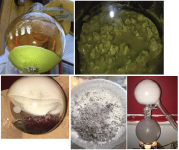Jesus spoke in parables to conceal big secrets from the ordinary people. Jesus was an Alchemist who knew how to make the "Tree Of Life" / Philosopher's Stone and he only taught his disciples those secrets/mysteries:
Matt 13:
"And he answered them, “To you it has been given to know the secrets of the kingdom of heaven, but to them it has not been given. 12For to the one who has, more will be given, and he will have an abundance, but from the one who has not, even what he has will be taken away. 13This is why I speak to them in parables, because seeing they do not see, and hearing they do not hear, nor do they understand."
You're not supposed to understand the parables unless you've been initiated into the "mysteries". The parables relate to parts of those mysteries.
For example,
the parable of the corn of wheat:
"Verily, verily, I say unto you, Except a corn of wheat fall into the ground and die, it abideth alone: but if it die, it bringeth forth much fruit."
This is a key principle of alchemy, the "putrefaction" stage in which in order for Nature to remake a thing, it must first decompose and putrefy totally. That's what Jesus is really saying here. It is an alchemical reference.
Parable of New Cloth on Old Garment - Matthew 9:16-17
- “No one sews a patch of unshrunk cloth on an old garment, for the patch will pull away from the garment, making the tear worse. Neither do people pour new wine into old wineskins. If they do, the skins will burst; the wine will run out and the wineskins will be ruined. No, they pour new wine into new wineskins, and both are preserved.”
This highlights the basic principle of fermentation which is a core part of the Great Work of alchemy. It's warning that if you don't take the necessary precautions the alchemy vessels (glass flasks etc) will explode/burst thereby ruining the work.
- He told them another parable: “The kingdom of heaven is like a mustard seed, which a man took and planted in his field. Though it is the smallest of all seeds, yet when it grows, it is the largest of garden plants and becomes a tree, so that the birds come and perch in its branches.”
Some alchemy knowledge is needed to understand this one. Basically, in the Great Work of alchemy we are creating a substance in the flask that acts as a "magnet" for the quintessence, the stuff that pervades every living thing. If you do the work correctly then it will attract that quintessence into the substance which will transform the substance. The parable is an allegory for this. The mustard seed and plant are the particular substance being made in the alchemist's flask and the birds are the quintessance taht will be attracted to it.
Parable of Pearl of Great Price - Matthew 13:45-46
- “Again, the kingdom of heaven is like a merchant looking for fine pearls. When he found one of great value, he went away and sold everything he had and bought it.
The Philosopher's Stone has many different names. Tree of Life, Alkahest, Ambrosia, Nectar, Soma and so on. ANotehr of it's names it the "Pearl Of Great Price". When you have the Philosopher's Stone you have the most valuable thing on Earth, better than any riches.
Confirmation of the name here:
Gift of the C.G. Jung Institute of Los Angeles
archive.org
Essentially, Jesus was a mystic/alchemist with great esoteric knowledge. He had the Philosopher's Stone and used it to heal people and help them. At the same time he didn't share that knowledge with ordinary people. Possibly because it's very powerful knowledge and in the wrong hands could see much evil occur in the world. Possibly because he wanted people to believe he was special, had super powers etc so they would follow him.


